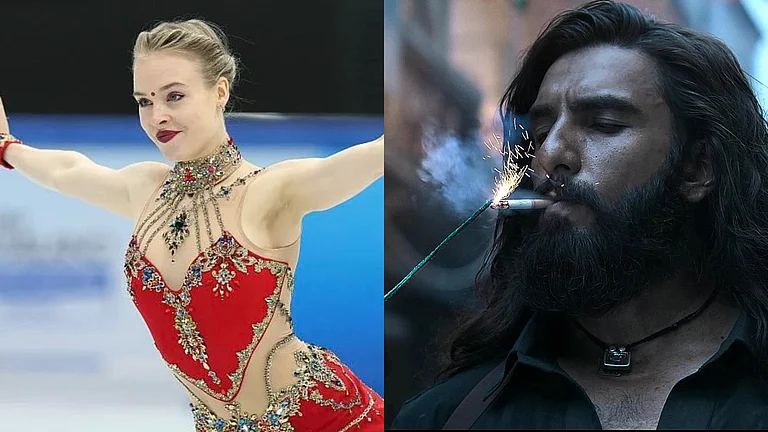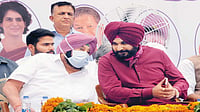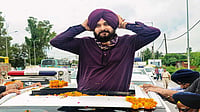Poor administration, deteriorating law and order, crimes against women, rising unemployment or caste and communal unrest—Uttar Pradesh isn’t a stranger to any of these. Successive state governments have struggled to reverse this perception, and failed. The National Crime Records Bureau places UP among the top five states in almost all categories of heinous crime—rape, murder or crimes against the scheduled caste. Take the Hathras case as an instance. A 19-year-old Dalit woman was allegedly gang-raped and strangled by four upper-caste men and she died in a Delhi hospital. Another 22-year-old Dalit woman was gang-raped in Balrampur days later. Soon after, three minor Dalit sisters were attacked with acid by an unidentified man in their home in Gonda. Yet, with 17 months to go before the UP assembly elections, there’s no sign of anger among the masses against the government. Why? Is it because there’s no Opposition to help the people ventilate their anger? Where is the Opposition in the state famous for its acutely political electorate?
“The biggest advantage that Yogi Adityanath and the BJP have in UP today is the complete absence of an Opposition,” political analyst Sharat Pradhan tells Outlook. Mayawati’s Bahujan Samaj Party (BSP) and Akhilesh Yadav’s Samajwadi Party (SP)—the two key Opposition forces in UP—have been “absolutely dormant”, while the Congress, long relegated to a fringe outfit in the state’s politics, “is still down in the dumps despite recent attempts at revival”, says Pradhan. In a 403-member assembly, the BJP has an absolute majority. In the March 2017 state polls, it won 312 seats while the SP and Congress—allies in the election—took just 47 and seven seats respectively. The BSP too was decimated, finishing with just 19 seats. And now, with its rivals struggling for electoral resurgence, the BJP has been exuding confidence of sweeping the 2022 assembly elections too.
Keshav Prasad Maurya, the state’s deputy chief minister, brushes aside all allegations of poor governance and deteriorating law and order. “Development work in UP have been moving ahead rapidly. We are working to ensure a crime-free UP where every section of society feels safe,” he says, while accusing the Congress of “misguiding people by politicising issues like the Hathras case and farm laws… they have no other work and they will continue to sit in Opposition”.
The BJP had promised to rid UP of crime, ensure swift and effective justice, and the government indeed went after criminals. Result: as many as 122 alleged criminals were shot dead (including gangster Vikas Dubey), more than 2,000 wounded and about 13,000 held in 6,126 police “encounters” between March 2017 and July 2020. But in the administrative lexicon, ‘criminal’ is also a synonym for dissenters. Through the past two years, a wide array of public-spirited individuals—from Dr Kafeel Khan and journalist Prashant Kanojia to anti-CAA activists Sadaf Jafar, Deepak Kabir, retired IPS officer S.R. Darapuri—were jailed on sedition charges for dissenting against the government.
Another dissenting voice the BJP singles out is the Congress—quite an irony because the party hasn’t been a formidable political force for nearly three decades in the state. The BJP’s attacks against the SP and BSP are, by comparison, far more tepid. Since 1991, pushed to the fringe by an ever ascendant politics of mandal and kamandal, the Congress has unsuccessfully tested various revival strategies in UP. In the 2009 Lok Sabha polls, Rahul Gandhi succeeded partially when the Congress managed to wrest 21 of the state’s 80 seats—its best tally since 1991. The gains, however, were lost quickly. By the 2012 assembly polls, the Congress was on a downward spiral again.

Akhilesh Yadav was in London, where he took his family on a holiday in 2018 (as this photo shows).
On January 23 last year, when Rahul—then Congress president—appointed sister Priyanka Gandhi Vadra as the party’s general secretary in-charge of eastern UP (Jyotiraditya Scindia was given charge of western UP), he conceded that he wasn’t expecting any quick results. Rahul was right. Priyanka couldn’t even help him retain his Amethi seat in the 2019 Lok Sabha polls. In the months that followed, Priyanka’s efforts at reviving the Congress in UP were sporadic. She hit the right notes last July with her protest against the brutal caste violence in Sonbhadra, but failed to build a statewide agitation. Earlier this year, she joined cause with the anti-CAA protestors in Lucknow. But the coronavirus-induced lockdown derailed her momentum.
The past six months have witnessed a more active Priyanka. That the SP and BSP leaderships have been largely absent has only helped her. The migrant crisis during the Covid-lockdown allowed Priyanka to embarrass the state government. The fierceness of the Gandhi siblings during the Hathras case has once again let Priyanka keep the Congress in news in UP. With Akhilesh holidaying in London (he returned to Lucknow this week) and Mayawati choosing against meeting the victim’s family or even sending her envoy Satish Mishra to Hathras, Priyanka was the focus of media and political attention. But the big question is: whether this frenzy of activity in the Congress will sustain until the assembly polls? “There is a vast constituency of people who are unhappy with the BJP. If the Congress manages to sustain this momentum and Priyanka decides to shift to Lucknow and be more visible and accessible, the party can improve its electoral tally substantially. But then, the Congress has a tendency to reach the crescendo too early and then wane away,” says Pradhan. He also believes that if the Gandhi family is really serious about UP, interim party chief Sonia Gandhi and Rahul must ensure Priyanka shifts base to Lucknow and is declared the CM face. “The impression that a Gandhi is too big to enter state politics must be broken but given the way the Congress works, I also know that this will not happen,” he says.
Ajay Kumar Lallu, a two-term Congress MLA who has been arrested or detained over a dozen times for leading protests against the state government, claims that the Congress has rattled not just the BJP but also the SP and BSP. “It is understandable for the BJP to attack us when we take on the Yogi government, but why are SP and BSP criticising us? This shows that we are winning the people’s trust. In the past year, over 50,000 Congress workers across UP have been slapped with various cases. I have 28 cases against me,” he says. He asserts that the Congress’s activities will pick more pace from December and Priyanka could “spend over 15 days each month travelling across the state to connect with the people and expose the BJP”.
The SP and BSP feel that Priyanka’s antics will not yield any major results. “They have to show this aggression because they are starting from zero,” says Samajwadi MP for Moradabad, S.T. Hasan, rejecting the charge that his party is giving the BJP a free run. “The SP has a pan-UP presence and we have been resisting the BJP’s dictatorial and communal politics,” Hasan says. BSP MP Danish Ali too says his party has been “vocal when needed but does not believe in politicising any tragedy”.

Several BSP and SP lawmakers concede on condition of anonymity that their traditional vote base was fast eroding. A BSP Lok Sabha MP says, “Our core strength was the Dalit vote. In 2014 and 2019, besides the Jatavs (Mayawati’s community), several Dalit sub-castes moved to the BJP. Mayawati should have focused on winning them back, but instead she kept reaching out to Brahmins.” And so, he adds, “non-Jatav Dalits don’t trust us now and may even see Chandrashekhar Azad Ravan as their leader; the Brahmins are uneasy with BJP because of Yogi’s preference for Thakurs but they are unlikely to desert the BJP in a big way because of the party’s Hindu pride plank. A realignment of some OBCs, Dalits and Muslims with the Congress is also possible.”
The same conundrum has been making several SP leaders uneasy. A former SP MP close to party founder and Akhilesh’s father, Mulayam Singh Yadav, says that “non-Yadav OBCs have been drifting towards the BJP and Akhilesh has shown no interest in winning them back. Given the communal hate that the BJP has nurtured, our Muslim outreach has also dented the SP’s popularity among Hindu OBC sub-groups.” The rift within the Yadav clan since the fallout between Akhilesh and his uncle, Shivpal Yadav, followed by Akhilesh’s failed coalition with Mayawati in the Lok Sabha polls despite Mulayam’s reservations has also rankled the traditional SP voter, sources say.
Lucknow-based senior journalist Atul Chandra agrees that the OBC vote-bank of the SP and the Dalit bloc of the BSP are frustrated with the two parties. He believes the SP and BSP do not criticise the BJP because of the many cases of corruption against Mayawati and Mulayam, which can be re-opened anytime. However, Chandra says the “natural destination” for these disenchanted voters will continue to be the BJP, because the Congress is “still not seen as a party that can win and no one wants to waste their vote”. The Congress in UP has a vote-share of around 6 per cent in the assembly polls, says Chandra, explaining that to be in a position to form the government or be the main opposition party, “the Congress will have to ramp up its vote share by over 20 per cent and at the moment people don’t see that happening; so why will they vote for the party?”
Congress leader Lalitesh Pati Tripathi concedes that his party still needs to work hard in reviving its grassroots presence and sustain the present pace of its political activity. “In the past, we made blunders, but things are changing. We have a packed schedule of political activities and every office-bearer has been assigned specific tasks by Priyanka,” says Tripathi, whose great-grandfather Kamlapati Tripathi was a former chief minister and Congress stalwart.
Eight assembly segments in UP will witness bypolls in November. None of the opposition parties seem to be in contention to win any of these seats—not even Bangarmau in Unnao district that fell vacant after BJP MLA Kuldeep Sengar was awarded a life term in the 2017 Unnao rape case. Journalist Chandra says a sweep in the bypolls will “only embolden Adityanath further as he will see the victory as endorsement of his governance model”. The Opposition, meanwhile, can continue playing catch-up.


























